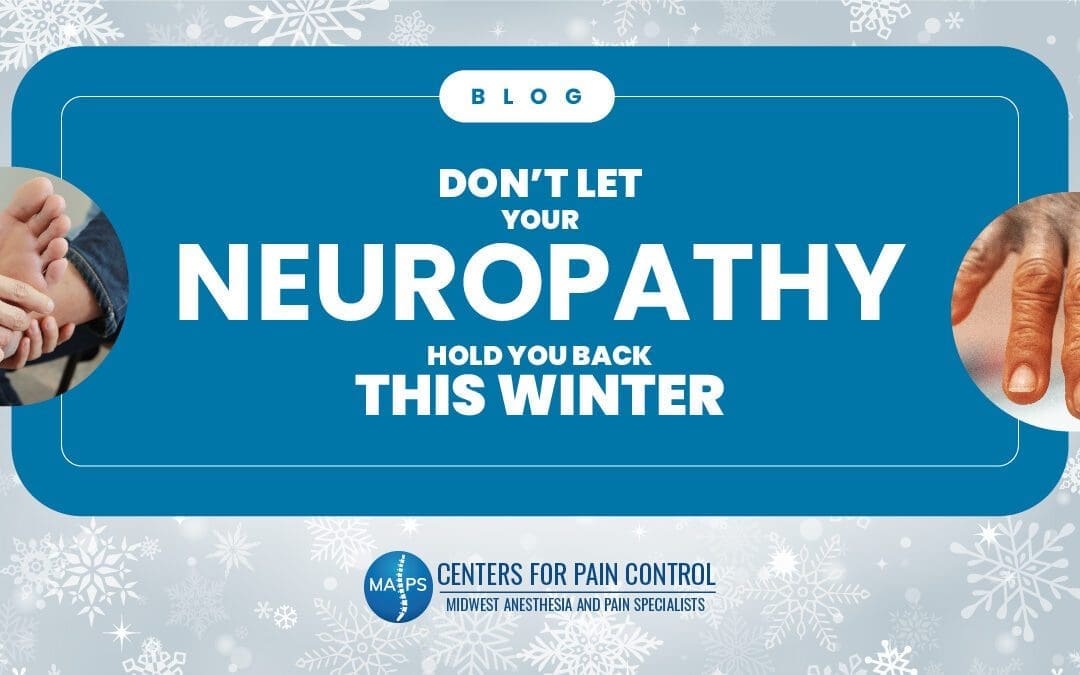Midwest winters can be magical; quiet evening snowfalls and crisp, sparkling mornings are a welcome respite that makes the high heat and humidity of the intense summer months a distant memory. However, along with the decrease in temperature can come an unwelcome increase in neuropathy pain for those with the condition. When cold weather brings on prickling, tingling, sharp throbbing, numbness, and burning, it can really hamper enjoyment of seasonal and holiday activities. What causes these changes in neuropathy symptoms, and how can Chicago’s pain specialists at MAPS help?
Peripheral Nerves and Injury
Peripheral nerves in the body are any of those outside of the brain and spinal cord, and they act as a communicator between the brain and the rest of the body. When we move, it’s the brain that sends commands through the spinal cord to the peripheral nerves, and those nerves that send information about pressure, balance, and motion back to the brain. Occasionally, these nerves become damaged, and peripheral nerve disorders like neuropathy can occur. Not only can this trigger painful cramping, tingling, and burning in the affected areas (very often hands and feet), it can also lead to numbness, muscle weakness, and even loss of function.
Cold Weather Conundrum
It’s not entirely understood how cold weather impacts neuropathy symptoms, but there are some widely accepted concepts about these weather woes. Our bodies respond physiologically to any changes in our environment, and colder conditions create challenges in communication for the nerves. When temperatures drop, blood flow tends to leave the extremities to move closer to the core to keep the vital organs safe and warm. This is why hands and feet, at the periphery of the body, tend to get cold first when we’re exposed to the elements. Less blood flow means slower communication and a slower neural response to relieve pain triggers. Also, lower temps are also associated with atmospheric pressure changes that impact the body, and damaged nerves will have a hard time making sensory changes in response.
Tips for Cold Care
There are a number of things you can do to try to manage neuropathy symptoms preemptively:
- Make sure to dress in warm layers, paying special attention to ears, hands, and feet, which get cold easily when exposed to wind and cool temperatures.
- Avoid consuming caffeine and alcohol during the colder months; caffeine can narrow blood vessels, reducing blood flow, and alcohol consumption can lead to vitamin deficiencies that hamper peripheral nerve health.
- Plan for the weather—expecting a lot of cold? You might reschedule outdoor activities to a more temperate day.
- Avoid smoking, as the cigarette smoke slows circulation and contributes to nerve damage.
- Maintain a regular exercise regime to improve overall circulation in the body.
Welcome Winter Again
When simple interventional ideas aren’t staving off the chill, it may be time to reach out to MAPS Centers for Pain Control to get your condition under control. At MAPS, we understand that pain is a complex condition that impacts many facets of your life. To successfully deliver long-term relief and comprehensive support to our clients, we’ve dedicated years of research to ensure that we offer the most advanced neuropathy treatment available today, which may include medication and supplement management, physical therapy, acupuncture and more. When the temperatures dip, it’s time to check in with Chicago’s best in neuropathy pain relief. Call MAPS today to learn more about how we can help!


